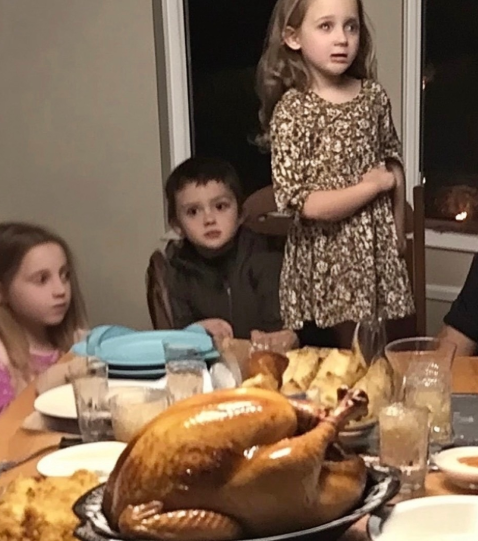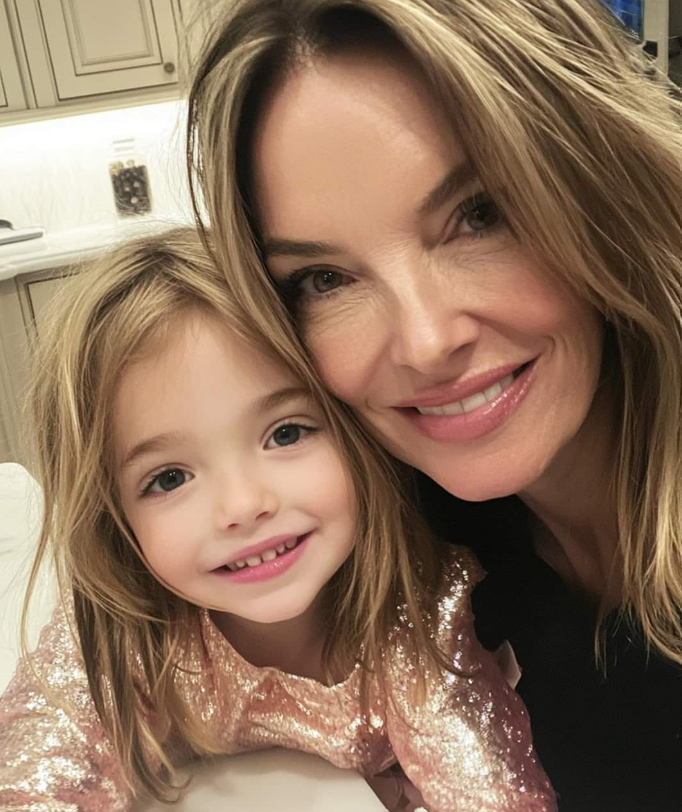Thanksgiving is supposed to be about love, gratitude, and family, but for us, it became a day that upended everything I thought I knew about my husband. What started as a warm, festive gathering ended with a shocking truth no one saw coming.
The house smelled of roasted turkey and spiced pies, and laughter echoed from every corner. Peter, my husband, was busy carving the turkey, while I floated between the dining room and kitchen, making sure our guests felt at home. Our eight-year-old daughter, Emma, usually chatty and brimming with excitement, seemed distracted. Her eyes constantly darted toward the window, and she fidgeted with the hem of her dress.
I thought it was nerves or anticipation for the meal, but her silence was uncharacteristic. Peter smiled at her from across the table, but she didn’t respond, her small hands tightening into fists. Then, just as I was about to carve the turkey, she stood on her chair, her voice ringing clear and loud, cutting through the buzz of conversation:
“Where’s the woman Dad hides in the shed?”
The room fell silent. Time seemed to stop. My stomach turned cold as I looked at Peter. His face went pale, and his fork froze in mid-air.
“Sweetheart, what are you saying?” I asked, my voice shaky, my heart pounding.
“The woman in the shed!” Emma said, her little hands on her hips. “I saw her last week. Dad goes to see her when you’re not home!”
A wave of murmurs swept across the table as my gaze shifted to Peter. He looked utterly stricken, unable to meet my eyes. Finally, he stood and gestured for me to follow. “Emily, we need to talk.”
Confused and filled with dread, I followed him outside into the chilly November air. We crossed the yard in silence, heading toward the old shed tucked behind the garden. My palms were sweaty, my mind racing with fears I wasn’t ready to confront. When Peter stopped at the shed door, he hesitated, his face a mix of guilt and sorrow.
“Emily,” he began, his voice trembling, “I didn’t want it to happen like this.”
He pushed the door open slowly, revealing a woman sitting on a battered stool. Her clothes were worn, her face etched with lines of hardship, and her hair streaked with gray. She looked up at us with tired, wary eyes, her hands trembling slightly.
“Who is this?” I whispered, the words barely leaving my lips.

Peter took a deep breath. “This is Janet… my biological mother.”
The world spun. I thought Peter’s mother had passed years ago. He explained, voice heavy with emotion, that Janet had abandoned him as a child, leading to his adoption. A few months ago, he’d stumbled upon her homeless near his office. Unable to turn away, he brought her to the shed, unsure how to explain it to me.
Janet’s voice, quiet but firm, broke the silence. “I never meant to cause trouble. I told Peter I could manage, but he insisted on helping.”
I felt a surge of emotions—betrayal at Peter’s secrecy, pity for the broken woman before me, and understanding of the pain my husband must have carried.
“Janet,” I said softly, “you don’t need to hide out here. We’ll find a better solution.”
Back inside, we introduced Janet to our family. Though the room was filled with questions, there was also kindness. Emma, wide-eyed with curiosity, asked, “Are you really my grandma?”
Janet nodded, her smile small but sincere.
“Does that mean you’ll stay for Thanksgiving?” Emma asked, hope shining in her eyes.
Janet’s voice trembled as she replied, “If it’s okay with everyone.”
Peter looked at me, his eyes brimming with gratitude. I reached for his hand, squeezing it. “Family is family,” I whispered.
That Thanksgiving, we raised our glasses not just to the holiday, but to forgiveness, second chances, and the messy, complicated beauty of family.
This story, while inspired by true events, has been fictionalized to protect privacy. Names, details, and events have been altered. Any similarities to actual people or situations are purely coincidental.
